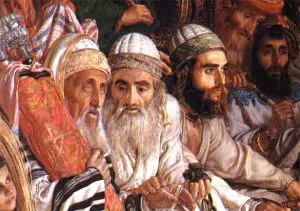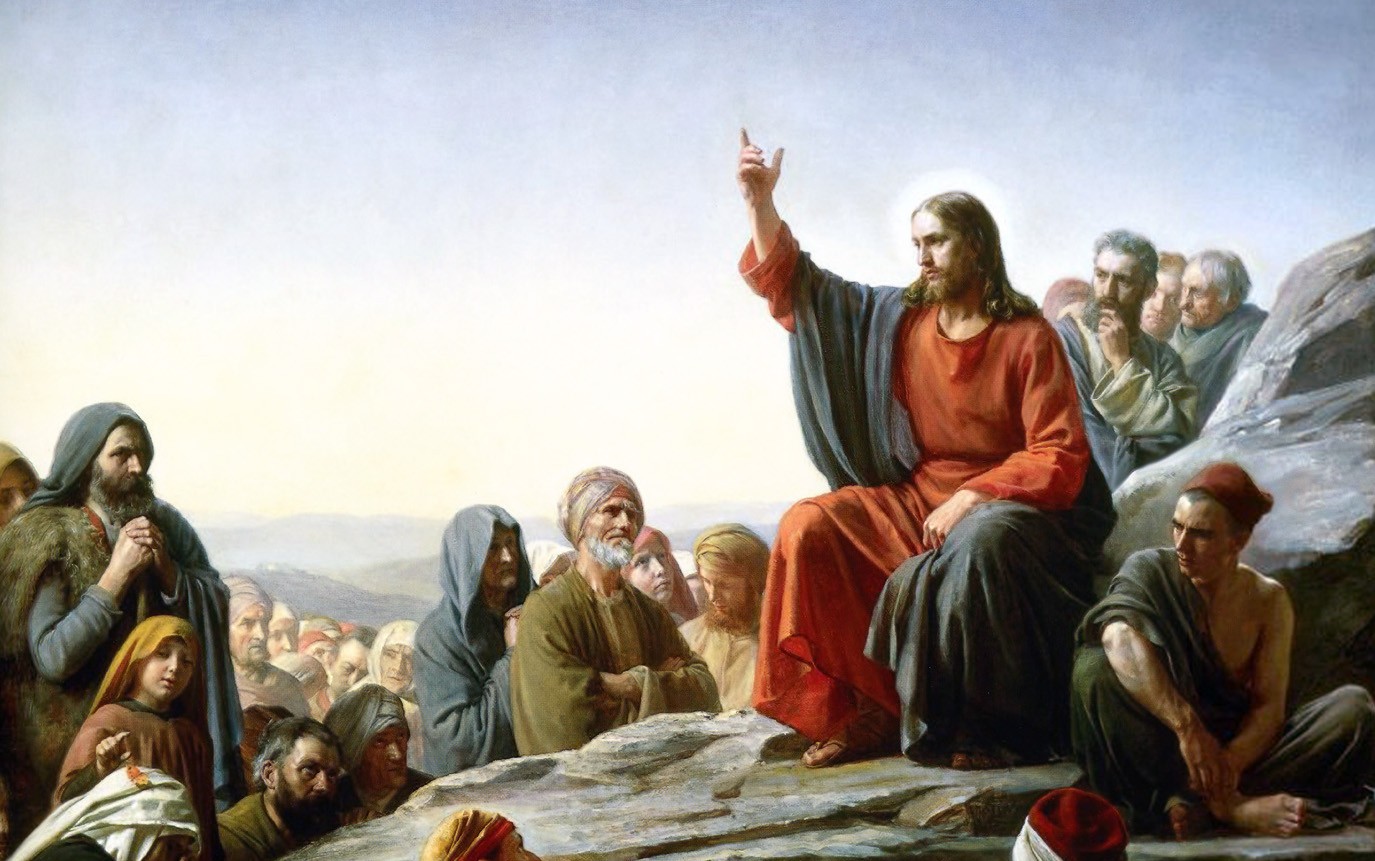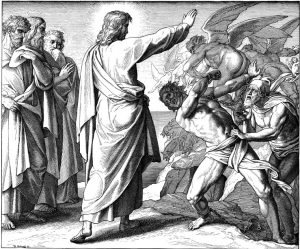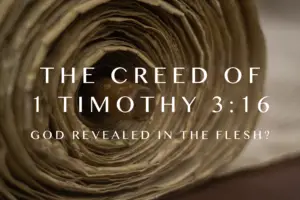Those who encountered Jesus during his earthly ministry may have debated whether or not he was the Messiah,[1] but few, if any, debated his ability to teach. On the contrary, crowds were astonished by his teaching:
Mark 11:18 (NASB) The chief priests and the scribes heard this, and began seeking how to destroy Him; for they were afraid of Him, for the whole crowd was astonished at His teaching. (emphasis added)
Many people, including Nicodemus, a ruler of the Jews, recognized that Jesus’ teachings, and the signs that accompanied them, were evidence, not that he was God, but that God had sent him and was with him:
John 3:1-2 (NASB) Now there was a man of the Pharisees, named Nicodemus, a ruler of the Jews; 2 this man came to Jesus by night and said to Him, “Rabbi, we know that You have come from God as a teacher; for no one can do these signs that You do unless God is with him.” (emphasis added)
Jesus Was Unlike Any Other Teacher
 Jesus was unlike any other teacher they had ever seen or heard. His teachings were in stark contrast to that of the scribes, whose role in Jewish society had evolved from being merely copyists of the law to interpreters and teachers of it:[2]
Jesus was unlike any other teacher they had ever seen or heard. His teachings were in stark contrast to that of the scribes, whose role in Jewish society had evolved from being merely copyists of the law to interpreters and teachers of it:[2]
Mark 1:21-22 (NASB) They *went into Capernaum; and immediately on the Sabbath He entered the synagogue and began to teach. 22 They were amazed at His teaching; for He was teaching them as one having authority, and not as the scribes.(Luke 4:31-32)
As one author explains, the difference between Jesus’ teaching and that of the scribes was the source of the respective words:
The common people were astonished. He was not a scribe. He had no religious credentials. Yet he spoke like a king. His sayings were a new Sinai. The scribes quoted authorities; he spoke with authority. They loved tradition, and no rabbi won a hearing unless he could prove that his word was based on past wisdom; so the scribes drew stale water from closed cisterns. But the words of Jesus were like a spring, clear, fresh, with power to slake the soul’s thirst.[3]
Indeed, as Scottish theologian, James Stuart, said, “The teaching of Jesus has had a power and an effect with which the influence of no other teacher can even for a moment be compared.”[4]
It was Jesus’ lack of any formal education that made his teachings even more amazing in the mind of his first century audience:
John 7:14-15 (NASB) But when it was now the midst of the feast Jesus went up into the temple, and began to teach. 15 The Jews then were astonished, saying, “How has this man become learned, having never been educated?” (emphasis added)
Those from his home town of Nazareth were especially amazed when they heard Jesus teach for they knew that he was the carpenter’s son and not a trained rabbi:
Matthew 13:54-56 (NASB) He came to His hometown and began teaching them in their synagogue, so that they were astonished, and said, “Where did this man get this wisdom and these miraculous powers? 55 “Is not this the carpenter’s son? Is not His mother called Mary, and His brothers, James and Joseph and Simon and Judas? 56 “And His sisters, are they not all with us? Where then did this man get all these things?” (emphasis added)
How was Jesus able to speak such life-giving words?[5] The authors of Sitting at the Feet of Rabbi Jesus, claim to have the answer. They purport that Jesus was able to teach the Word of God with such clarity and power because he wrote it:
“Many of the other rabbis tended to focus on defining the minimum requirements of the law…The rabbis lacked the authority to say, ‘This is what God really meant when he told us to keep the Sabbath holy.’ Who could know that but God himself?…As the author of the Torah, Jesus alone was able to explain its true intention.”[6] (emphasis added)
Another author offers a similar observation: “Remember, as the God of the Old Testament, Jesus was the one Who had delivered the Ten Commandments in the first place.”[7] To be sure, orthodoxy points to John 1:1-3 as proof that Jesus was able to deliver the Word of God precisely because he is God the Word. With this belief in place, it’s no wonder that Trinitarian minister and author, Frank G. Allen, writes, “Jesus was the world’s great teacher, and yet He was never taught.”[8] Or was he?
Jesus’ Words Were Not His Own
 Controverting orthodoxy is Jesus’ own explanation of how he was able to speak such profound, life-changing words. Throughout the gospel of John (the very book that many claim proves the deity of Christ), Jesus repeatedly rejects any notion that the words he speaks are his. He pointedly declares that he says nothing on his own initiative. Rather, Jesus gives God the Father full credit for his message. For example:
Controverting orthodoxy is Jesus’ own explanation of how he was able to speak such profound, life-changing words. Throughout the gospel of John (the very book that many claim proves the deity of Christ), Jesus repeatedly rejects any notion that the words he speaks are his. He pointedly declares that he says nothing on his own initiative. Rather, Jesus gives God the Father full credit for his message. For example:
John 3:34 (NASB) “For He [Jesus] whom God has sent speaks the words of God; for He [God] gives the Spirit without measure. (emphasis added)
John 8:26 (NASB) “I have many things to speak and to judge concerning you, but He who sent Me is true; and the things which I heard from Him, these I speak to the world.” (emphasis added)
John 8:40 (NASB) [Jesus said,] “But as it is, you are seeking to kill Me, a man who has told you the truth, which I heard from God; this Abraham did not do. (emphasis added)
John 14:10 (NASB) “Do you not believe that I am in the Father, and the Father is in Me? The words that I say to you I do not speak on My own initiative, but the Father abiding in Me does His works. (emphasis added)
John 14:24 (NASB) “He who does not love Me does not keep My words; and the word which you hear is not Mine, but the Father’s who sent Me. (emphasis added)
John 15:15 (NASB) “No longer do I call you slaves, for the slave does not know what his master is doing; but I have called you friends, for all things that I have heard from My Father I have made known to you. (emphasis added)
John 17:1 and 6 and 8 (NASB) Jesus spoke these things; and lifting up His eyes to heaven, He said, “Father…6 “I have manifested Your name to the men whom You gave Me out of the world; they were Yours and You gave them to Me, and they have kept Your word…8 for the words which You gave Me I have given to them… (emphasis added)
John 17:14 (NASB) “I have given them Your word; and the world has hated them, because they are not of the world, even as I am not of the world.
Moreover, in John chapter 7, Jesus powerfully addresses the question as to how he became so learned:
John 7:14-17 (NASB) But when it was now the midst of the feast Jesus went up into the temple, and began to teach. 15 The Jews then were astonished, saying, “How has this man become learned, having never been educated?” 16 So Jesus answered them and said, “My teaching is not Mine, but His who sent Me. 17 “If anyone is willing to do His will, he will know of the teaching, whether it is of God or whether I speak from Myself. (emphasis added)
Here, Jesus clearly differentiates between himself and God. He says that either the teachings came from God or they came from himself. It’s important to emphasize that the man from Nazareth did not include himself in the “God” category. If Jesus is God, he would necessarily have to include himself. But because he is not God, he rightly tells the crowd that the teachings are not his but God’s.
The Father Taught the Son What to Say
 Despite what Allen and other scholars say, Jesus was taught by the Father. Without a doubt, the Great Teacher had a Teacher:
Despite what Allen and other scholars say, Jesus was taught by the Father. Without a doubt, the Great Teacher had a Teacher:
John 8:27-28 (NASB) They did not realize that He had been speaking to them about the Father. 28 So Jesus said, “When you lift up the Son of Man, then you will know that I am He, and I do nothing on My own initiative, but I speak these things as the Father taught Me. (emphasis added)
God then commanded Jesus to speak the words He had given him:
John 12:48-50 (NASB) “He who rejects Me and does not receive My sayings, has one who judges him; the word I spoke is what will judge him at the last day. 49 “For I did not speak on My own initiative, but the Father Himself who sent Me has given Me a commandment as to what to say and what to speak. 50 “I know that His commandment is eternal life; therefore the things I speak, I speak just as the Father has told Me.”
How is it that God the Word did not speak his own words? Could it be because Jesus is not God? Trinitarian scholar and author, A.W. Tozer, inadvertently makes this point when he declares that God cannot be taught:
To say that God is omniscient is to say that He possess perfect knowledge and therefore has no need to learn. But it is more: it is to say that God has never learned and cannot learn. The Scriptures teach that God has never learned from anyone…From there it is only one step to the conclusion that God cannot learn. Could God at any time or in any manner receive into His knowledge that He did not possess and had not possessed from eternity, He would be imperfect and less than himself. To think of a God who must sit at the feet of a teacher, even though that teacher be an archangel or a seraph, is to think of someone other than the Most High God, make of heaven and earth.[9] (emphasis added)
And yet, Jesus said it was God the Father who taught him what to say. Jesus is not God. On the contrary, he is the disciple of God who was obedient even under extreme persecution:
Isaiah 50:4-6 (NASB) The Lord GOD has given Me the tongue of disciples, That I may know how to sustain the weary one with a word. He awakens Me morning by morning, He awakens My ear to listen as a disciple. 5 The Lord GOD has opened My ear; And I was not disobedient Nor did I turn back. 6 I gave My back to those who strike Me, And My cheeks to those who pluck out the beard; I did not cover My face from humiliation and spitting. (emphasis added)
Conclusion
Despite Jesus’ repeated pronouncement that his teachings were not his own, tradition persists in claiming that they are. Instead of crediting God the Father with the words of life, modern orthodoxy insists Jesus’ profound truths originated with him because he is God. It is time to reexamine traditional beliefs in light of what Scripture actually says, and concur that Jesus, the Great Teacher, had a Teacher.
[1] John 7:40-43, etc.
[2] The Scribes, accessed 3-13-20, https://bible.org/seriespage/7-scribes#P2_324
[3] The Interpreter’s Bible, New Testament Articles, Matthew and Mark, page 335. Quoted in Characteristics of Jesus as a Teacher, accessed 3-10-20, https://likeateam.com/9-characteristics-of-jesus-as-a-teacher/
[4] Ray Pritchard, “Why Was Jesus Called ‘Teacher?'” accessed 3-10-20, https://www.christianity.com/jesus/is-jesus-god/names-of-jesus/why-was-jesus-called-teacher.html
[5] John 6:63, 68.
[6] Ann Spangler and Lois Tverberg, Sitting at the Feet of Rabbi Jesus, (Grand Rapids, MI: Zondervan, 2009), p. 171.
[7] Christ Was Taught Directly by God the Father, accessed 3-12-20, https://www.cbcg.org/franklin/SA/SA_taughtbyGod.pdf
[8] Frank G. Allen, Autobiography of Frank G. Allen, Minister of the Gospel, as quoted in Christ the Great Teacher, accessed 03-12-20, https://biblehub.com/library/allen/autobiography_of_frank_g_allen_minister_of_the_gospel/vi_christ_the_great_teacher.htm
[9] A. W. Tozer, The Knowledge of the Holy, chapter 10 (HarperCollins, 1961).



